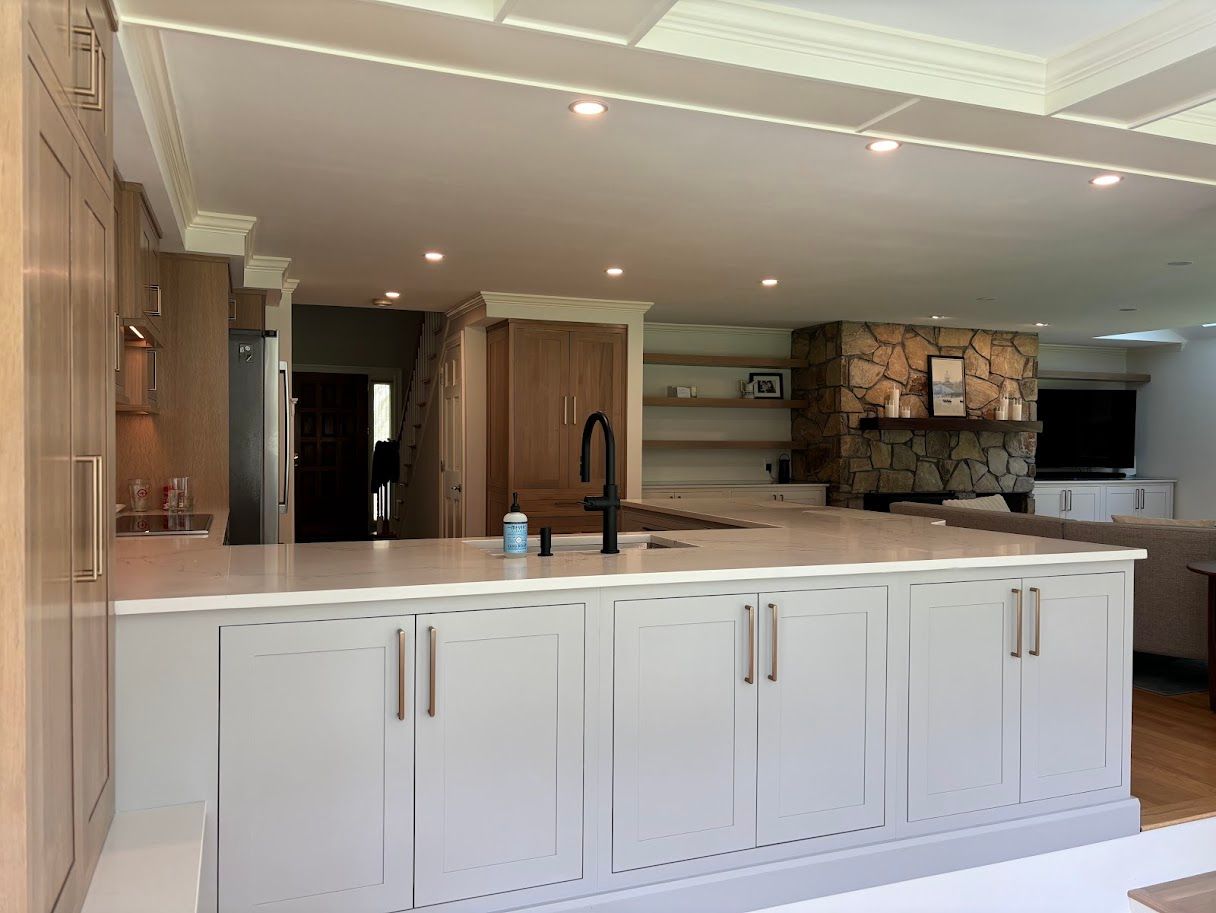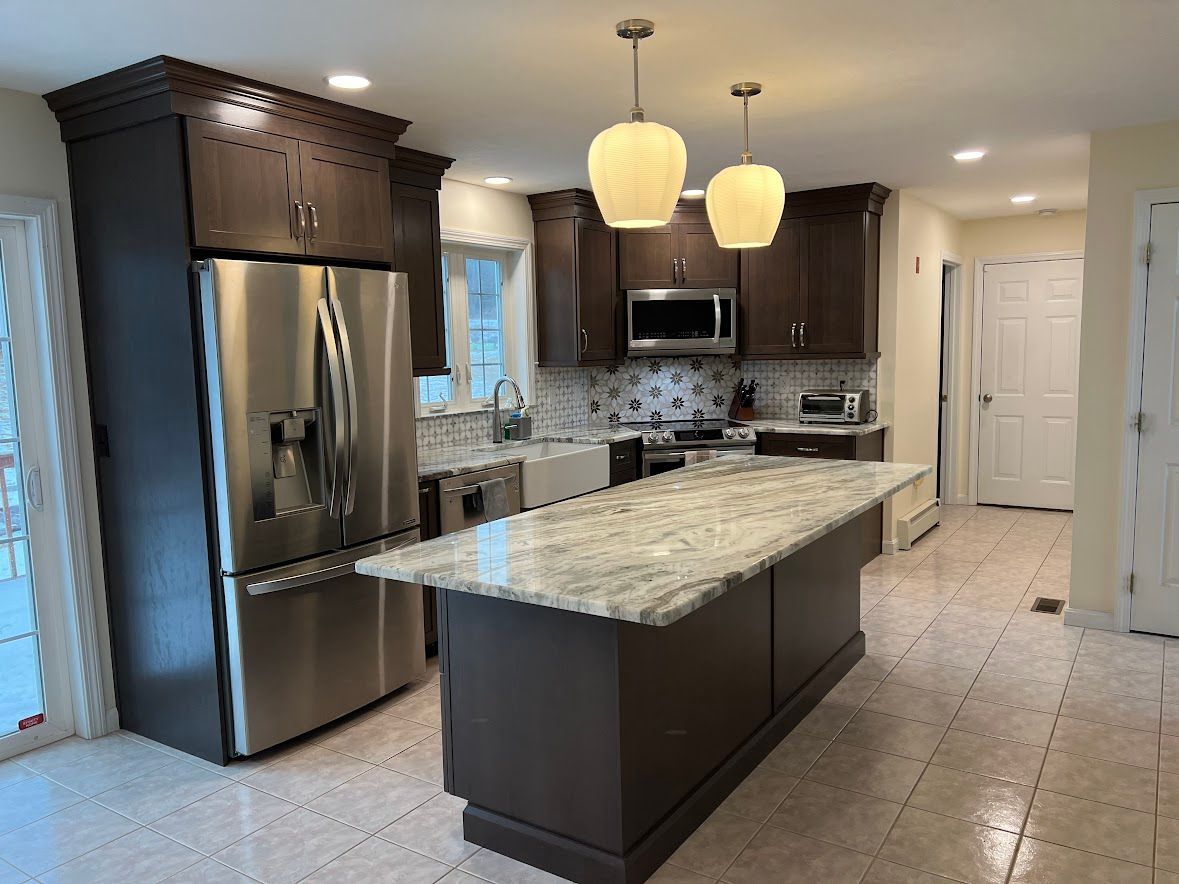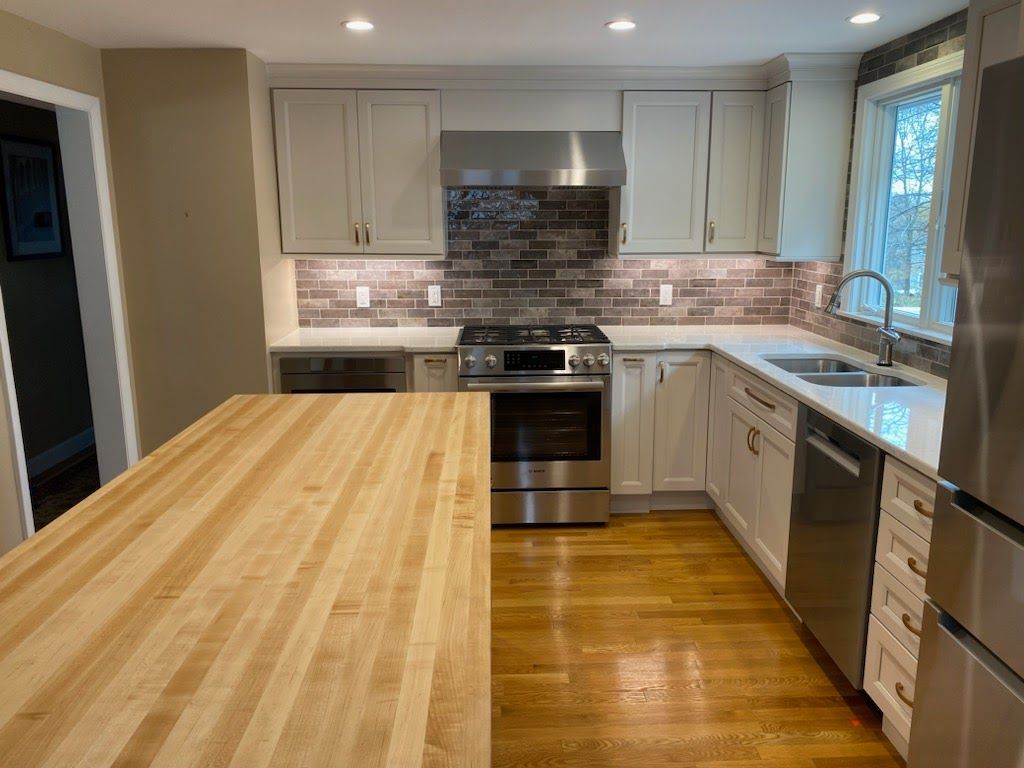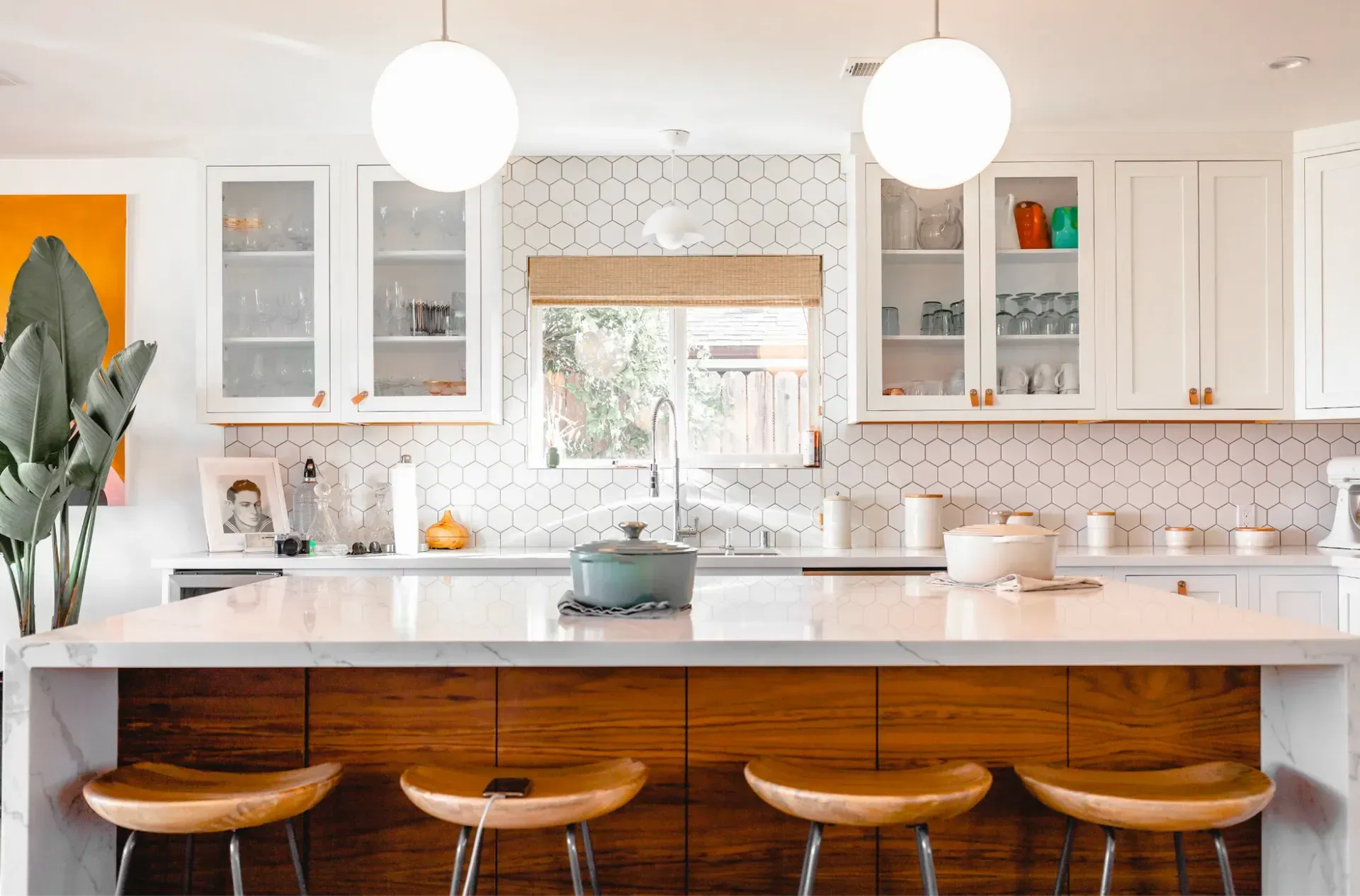How Much Does a Kitchen Remodel Cost in Massachusetts?
How Much Does a Kitchen Remodel Cost in Massachusetts? Your Complete 2025 Guide
Planning a kitchen renovation in Massachusetts? You're not alone. Kitchen remodeling consistently ranks as one of the most popular and valuable home improvement projects across the Bay State, from the bustling suburbs of Worcester County to the historic neighborhoods of Central Massachusetts. A well-executed kitchen remodel represents more than just a home improvement project—it's a strategic investment in your family's daily comfort, functionality, and property's long-term value.
Whether you're dealing with a cramped 1980s galley kitchen in Leominster or dreaming of transforming your outdated space in Worcester, Massachusetts kitchen renovation costs can vary dramatically based on your location, scope of work, material selections, and design goals. Understanding the true average cost of kitchen renovation in MA requires diving deep into the specific factors that influence pricing in our unique Massachusetts market.
This comprehensive guide will walk you through everything you need to know about kitchen remodel budget planning in Massachusetts, helping you make informed decisions that align with your vision and financial reality. From understanding cost breakdown kitchen remodel specifics to comparing high-end vs budget kitchen remodel options, we'll explore the real numbers behind Massachusetts kitchen renovations. You'll discover how factors like kitchen renovation cost per square foot, local permit requirements, and seasonal contractor availability can impact your bottom line.
Table of Contents
- Understanding the Massachusetts Kitchen Remodeling Market
- Factors Influencing Kitchen Remodel Costs in Massachusetts
- Average Cost Ranges for Kitchen Remodels in Massachusetts
- Money-Saving Strategies for Massachusetts Kitchen Remodels
- Return on Investment and Value of Massachusetts Kitchen Remodels
- Working with Massachusetts Kitchen Remodeling Professionals
- Financing Your Massachusetts Kitchen Renovation
- Conclusion
Understanding the Massachusetts Kitchen Remodeling Market
Massachusetts presents a unique landscape for kitchen remodeling projects. Our state's combination of historic homes, varied architectural styles, and strong real estate market creates specific opportunities and challenges for homeowners considering kitchen renovations.
The Commonwealth's robust economy, particularly in the Greater Boston area and Worcester County, supports a healthy home improvement market where quality craftsmanship commands premium pricing. However, this same economic strength means that remodeling contractors in Massachusetts often stay busy year-round, potentially affecting both availability and pricing structures.
Central Massachusetts, including cities like Worcester, Fitchburg, and Leominster, offers a sweet spot for kitchen remodeling value. Property values here support substantial renovation investments while avoiding the extreme premium pricing found in closer-to-Boston markets. Homeowners in these areas typically see strong returns on kitchen remodeling investments, making it an attractive proposition for families looking to improve both their daily living experience and their home's market value.
Factors Influencing Kitchen Remodel Costs in Massachusetts
Material Costs: The Foundation of Your Budget
Material selection represents the largest variable in any Massachusetts kitchen renovation budget. Understanding the cost spectrum for each major component helps you align your vision with financial reality.
Countertops: From Practical to Premium
Countertop costs in Massachusetts vary significantly based on material choice and local supplier availability. Laminate countertops, while budget-friendly at $20-40 per square foot installed, offer limited durability and resale value. Granite, a popular mid-range choice, typically runs $50-80 per square foot installed, with variation based on slab selection and edge treatments.
Quartz countertops have gained significant popularity among Massachusetts homeowners, offering consistent quality and low maintenance at $60-100 per square foot installed. For those seeking premium options, natural stones like marble or exotic granites can exceed $150 per square foot, while ultra-premium materials like Dekton or premium quartz slabs may reach $200+ per square foot.
Cabinet Solutions: Storage That Defines Your Space
Cabinet costs represent the single largest expense in most kitchen renovations, often accounting for 35-40% of your total kitchen remodel budget in Massachusetts. Stock cabinets from major retailers start around $100-300 per linear foot, offering basic functionality with limited customization options.
Semi-custom cabinets, popular among Massachusetts homeowners seeking quality without extreme premium pricing, typically range from $300 to $700 per linear foot. These options provide substantial customization opportunities while maintaining reasonable lead times and pricing predictability.
Custom cabinetry, crafted by local Massachusetts woodworkers, commands $700-1,500+ per linear foot but offers unlimited design flexibility and superior quality. Many Central Massachusetts cabinet makers specialize in matching existing architectural details, particularly valuable in historic home renovations.
Flooring: Building the Foundation
Kitchen flooring in Massachusetts must withstand our challenging climate while providing both beauty and functionality. Luxury vinyl plank (LVP) flooring offers excellent value at $4-8 per square foot installed, providing water resistance and durability perfect for busy family kitchens.
Ceramic and porcelain tile remain popular choices, ranging from $6-15 per square foot installed for standard options, with premium designer tiles reaching $20+ per square foot. Hardwood flooring, when properly sealed and maintained, creates timeless beauty at $8-15 per square foot for standard options, with exotic species and wide-plank options commanding premium pricing.
Natural stone flooring, including slate and granite tiles, offers a unique character perfect for New England homes. Depending on stone selection and pattern complexity, it typically costs $10-25 per square foot installed.
Appliance Costs: The Heart of Modern Cooking
Appliance selection dramatically impacts both your renovation budget and daily kitchen experience. Entry-level appliance packages from reputable brands typically start around $3,000-5,000 for a full suite including refrigerator, range, dishwasher, and microwave.
Mid-range appliances, popular among Massachusetts homeowners seeking reliability and features without extreme premium pricing, typically range from $6,000-12,000 for a complete package. These options often include energy-efficient features, particularly valuable given Massachusetts utility costs.
Premium and luxury appliances can easily exceed $20,000-$40,000 for a complete package. They offer commercial-grade performance, smart technology integration, and distinctive styling that enhances both functionality and resale value.
Additional Material Considerations
Lighting fixtures, plumbing fixtures, hardware, and finishing materials add substantial costs to any renovation. Depending on your style preferences and quality selections, plan for $2,000-8,000 in lighting costs, $1,000-4,000 for plumbing fixtures, and $500-2,000 for cabinet hardware and finishing touches.
Labor Costs: Professional Expertise in Massachusetts
Massachusetts labor costs reflect our state's strong economy and skilled workforce, with specialized trades commanding premium pricing for quality workmanship.
Average Contractor Rates Across Massachusetts
General contractors in Central Massachusetts typically charge $75-150 per hour for project management and coordination, with rates varying based on reputation, project complexity, and seasonal demand. Established contractors with strong local reputations and proper licensing often command higher rates but provide superior project management and quality assurance.
Specialized trades include electricians, who charge $85-125 per hour, plumbers, who charge $90-130 per hour, and tile installers, who charge $60-100 per hour. Cabinet installation specialists typically charge $40-80 per hour, while countertop fabrication and installation are usually priced per square foot based on material selection.
Permits and Legal Requirements
Permit costs MA kitchen renovation vary by municipality but typically range from $500-2,000 for comprehensive kitchen remodels. Worcester County communities generally require electrical, plumbing, and structural modifications permits, with some municipalities requiring separate permits for each trade.
Building permit costs in Central Massachusetts typically include plan review fees, inspection costs, and administrative charges. Major renovations involving structural changes, gas line modifications, or electrical panel upgrades may require additional specialized permits and inspections.
Working with remodeling contractors in Massachusetts who are familiar with local permit requirements ensures proper compliance while avoiding costly delays and complications during construction.
Size and Scope: Defining Your Project Parameters
Full Kitchen Renovation vs. Minor Updates
Complete kitchen renovations involving layout changes, new cabinetry, appliances, countertops, flooring, and electrical/plumbing modifications represent the highest investment category. These comprehensive projects typically range from $75,000 to $200,000+ in Massachusetts markets, depending on size, material selections, and complexity.
Partial renovations focusing on cabinet refacing, countertop replacement, and appliance updates offer significant transformation potential at more moderate investment levels, typically ranging from $25,000-75,000 depending on scope and material choices.
Minor updates, including painting, hardware replacement, lighting improvements, and select appliance replacements, can refresh kitchen aesthetics for $5,000-25,000, providing excellent value for homeowners planning to sell within a few years.
Upscale kitchen remodels, on the other hand, offer luxury and high-end finishes for those seeking a truly stunning and personalized space. These projects can range from $100,000 to upwards of $300,000 or more, depending on the level of customization and premium materials selected.
Staying in Same Footprint vs. Changing Footprint
Kitchen renovations and existing plumbing and electrical system maintenance offer significant cost advantages, avoiding expensive infrastructure modifications. These projects focus renovation budgets on visible improvements like cabinetry, countertops, and appliances while minimizing structural and utility costs.
Footprint modifications involving wall removal, plumbing relocation, or electrical panel upgrades substantially increase project complexity and costs. Moving plumbing lines can add $2,000-$8,000 to project costs, while electrical modifications may require $3,000- $10,000+, depending on existing infrastructure and new requirements.
Structural modifications requiring engineer approval and specialized permits can add $5,000- $15,000+ to project costs but may provide dramatic functionality improvements worth the investment in long-term family comfort and home value.
Impact of Custom Designs and Specific Requirements
Custom design elements like kitchen islands, specialty storage solutions, and unique architectural details add both cost and value to Massachusetts kitchen renovations. Depending on size and complexity, custom islands with seating, storage, and specialty features typically cost $5,000-20,000.
Specialty storage solutions, including pull-out organizers, lazy Susans, and custom pantry systems, enhance daily functionality while adding $2,000-$8,000 to project costs. These investments often provide excellent value for busy families that prioritize kitchen efficiency and organization.
Unique architectural elements like coffered ceilings, crown molding, and custom millwork enhance visual appeal while reflecting Massachusetts' architectural heritage. These features typically add $3,000-12,000 to project costs but significantly enhance aesthetics and resale value.
Average Cost Ranges for Kitchen Remodels in Massachusetts
Understanding realistic cost ranges for Massachusetts kitchen renovations helps homeowners set appropriate project budgets and expectations.

Small Kitchen Remodels: Maximizing Impact on Limited Budgets
Small kitchen renovations in Massachusetts, typically covering 70-120 square feet, focus on maximizing functionality and visual impact within budget constraints. Depending on material selections and the scope of work, these projects usually range from $25,000-$60,000.
Budget-conscious small kitchen remodels ($25,000-35,000) typically include cabinet refacing or painting, laminate countertops, standard appliances, ceramic tile flooring, and basic lighting updates.
Mid-range small kitchen renovations ($35,000-50,000) often include new stock or semi-custom cabinets, quartz or granite countertops, mid-range appliances, luxury vinyl or tile flooring, and improved lighting design.
Higher-end small kitchen remodels ($50,000- $60,000+) may include custom or semi-custom cabinetry, premium countertop materials, high-quality appliances, hardwood or natural stone flooring, and sophisticated lighting design.

Mid-Range Kitchen Remodels: Balancing Quality and Value
Mid-range kitchen remodeling services, covering 120-200 square feet, represent the sweet spot for many Massachusetts homeowners seeking substantial improvements without extreme premium pricing. These projects typically range from $60,000-120,000, depending on material selections and design complexity.
Standard mid-range renovations ($60,000-80,000) usually include semi-custom cabinetry, granite or quartz countertops, stainless steel appliance packages, quality flooring options, and comprehensive lighting design.
Enhanced mid-range projects ($80,000-100,000) often feature higher-quality cabinetry, premium countertop materials, upgraded appliances, specialty storage solutions, and custom design elements.
Premium mid-range renovations ($100,000-120,000) may include custom cabinetry elements, luxury appliances, unique design features, and high-end finishing materials.

High-End Kitchen Remodels: Luxury and Customization
Luxury kitchen renovations in Massachusetts typically involve extensive customization, premium materials, and sophisticated design elements. These projects generally range from $120,000-300,000+, depending on size, complexity, and material selections.
Entry luxury projects ($120,000-175,000) usually feature custom cabinetry, premium countertop materials, high-end appliances, luxury flooring options, and sophisticated lighting design.
Mid-luxury renovations ($175,000-250,000) often include completely custom cabinetry, exotic countertop materials, professional-grade appliances, and unique architectural elements.
Ultra-luxury kitchen remodels ($250,000+) feature unlimited customization, exotic materials, commercial-grade appliances, and extensive smart home integration.

Comparison to National Averages
Massachusetts kitchen remodeling costs typically run 15-25% above national averages, reflecting our state's strong economy, skilled workforce, and premium material availability. However, strong property values and robust resale markets often justify these higher investment levels through superior return on investment potential.
The national average cost of kitchen renovation often doesn't reflect regional variations in labor costs, permit requirements, and material availability. Massachusetts homeowners benefit from working with local professionals who understand regional market conditions and can provide accurate local pricing guidance.
Central Massachusetts markets often provide excellent value compared to Greater Boston pricing while maintaining access to quality contractors and material suppliers. This regional advantage allows homeowners to achieve exceptional results at more reasonable investment levels than metropolitan Boston markets.
Money-Saving Strategies for Massachusetts Kitchen Remodels
Reusing Existing Materials When Possible
Strategic material reuse can significantly reduce renovation costs while maintaining quality and functionality:
Hardwood flooring refinishing
Existing hardwood flooring, if in good condition, can often be refinished and extended into kitchen areas, saving $3,000-8,000 compared to complete replacement.
Cabinet refacing vs replacement
Quality cabinet boxes in good structural condition may be excellent candidates for refacing rather than replacement, potentially saving $15,000-30,000 while achieving a dramatic aesthetic transformation.
Appliance integration
Appliances in good working condition can often be retained and integrated into new designs, particularly if they meet current functionality needs and aesthetic preferences.
Buying Locally Sourced and Recycled Materials
Massachusetts' strong architectural salvage and reclaimed material markets offer unique opportunities for cost-effective, environmentally conscious material selections. Reclaimed hardwood flooring provides character and value, often superior to new materials, at 20-40% cost savings.
Local stone quarries and salvage operations throughout Central Massachusetts offer unique materials reflecting regional character while supporting local businesses. These sources often provide both cost advantages and distinctive materials unavailable through traditional retail channels.
Building relationships with local suppliers can provide access to discontinued inventory, overstock materials, and seasonal pricing advantages. Many Massachusetts suppliers offer contractor pricing to homeowners working directly with local trades.
Strategic Timing for Maximum Value
Scheduling During Slower Renovation Periods
Winter months often provide the best opportunities for securing favorable contractor pricing and availability throughout Massachusetts. Many contractors offer 10-20% discounts during slower periods while providing more flexible scheduling and personalized attention.
Late fall and early winter scheduling allows renovation completion before the spring selling season, maximizing resale value timing for homeowners considering future moves. This timing also ensures kitchen completion before major holiday entertaining seasons.
Avoiding peak construction periods (late spring through early fall) helps secure better pricing and contractor attention while reducing project timeline pressures. Early project planning allows homeowners to take advantage of optimal timing for both pricing and scheduling.
Value Engineering Strategies

Smart Investment Priorities for Massachusetts Kitchens
Prioritizing high-impact improvements over costly luxury features helps maximize renovation value within budget constraints. Focus on elements that provide both daily functionality and resale value, such as quality cabinetry, durable countertops, and efficient layouts. Massachusetts homeowners often achieve better results by investing 40% of their budget in cabinetry, 20% in labor, 15% in appliances, and 25% in other materials and finishes.
Mixing material price points strategically can create premium appearances at moderate costs. Investing in quality cabinetry while selecting mid-range appliances and countertops often provides better overall value than reverse prioritization. For example, choosing semi-custom cabinets with upgraded hardware paired with mid-range granite can deliver a high-end appearance at a fraction of luxury renovation costs.
Planning renovations in phases allows homeowners to spread costs over time while ensuring each phase provides immediate value. Initial phases might focus on cabinetry and layout improvements, with appliance and finishing upgrades completed in subsequent phases. This approach particularly benefits Massachusetts families managing multiple financial priorities while improving their daily kitchen experience.

Cost-Effective Upgrades with Maximum Impact
Cabinet hardware upgrades provide exceptional value, often transforming kitchen aesthetics for $300-800 investment. Replacing dated pulls and knobs with contemporary brushed gold or matte black hardware creates immediate visual impact without major renovation expenses.
Lighting improvements offer an outstanding return on investment. Under-cabinet LED lighting costs $200-600 while dramatically improving kitchen functionality and ambiance. Strategic pendant lighting over islands or breakfast bars adds design appeal and task lighting for a $400-1,200 investment.
Fresh paint in contemporary colors provides remarkable transformation value at minimal cost. Popular Massachusetts kitchen colors include soft grays, warm whites, and navy blues, which complement traditional and modern design elements while maintaining broad market appeal.
Return on Investment and Value of Massachusetts Kitchen Remodels
Property Value Impact in Massachusetts Real Estate
Kitchen renovations consistently rank among the highest return on investment home improvements in Massachusetts markets. Recent data suggests well-executed kitchen remodels recoup 65-85% of their cost in immediate property value increases, with premium markets often exceeding these averages.
Central Massachusetts markets particularly favor kitchen improvements, with many homes showing 75-90% cost recovery in property value increases. The region's strong economy and desirable suburban lifestyle support premium valuations for homes with modern, functional kitchens.
Quality kitchen renovations often become primary selling features in Massachusetts markets, frequently determining both sale speed and final pricing. Homes with recent, high-quality kitchen renovations typically sell 15-30% faster than comparable properties with outdated kitchens.
Long-Term Value Considerations
Beyond immediate property value impacts, kitchen renovations provide ongoing value through reduced maintenance costs and improved functionality. Modern appliances, quality cabinetry, and durable materials minimize ongoing repair and replacement expenses while enhancing daily living quality.
Energy-efficient appliances and lighting provide ongoing utility cost savings particularly significant given Massachusetts' higher energy costs. These operational savings often offset portion of renovation costs over 5-10 year periods while providing environmental benefits.
Quality renovations typically maintain their value and appeal for 15-20 years with proper maintenance, providing sustained property value benefits and family enjoyment throughout ownership periods.
Resale Value Maximization Strategies
Design Choices That Appeal to Massachusetts Buyers
Neutral color schemes and classic design elements ensure broad market appeal when selling Massachusetts homes. Traditional styles reflecting New England's architectural heritage often resonate strongly with regional buyers while maintaining timeless appeal. Popular Massachusetts kitchen design trends include shaker-style cabinetry, subway tile backsplashes, and hardwood flooring that complement the state's historic architectural character.
Quality material selections that emphasize durability and low maintenance appeal to Massachusetts buyers dealing with challenging climate conditions. Granite or quartz countertops, hardwood or luxury vinyl flooring, and quality cabinetry demonstrate long-term value. Massachusetts buyers particularly appreciate features like mudrooms, pantry storage, and breakfast nooks that support New England lifestyle preferences.
Open floor plans connecting kitchens to family living areas reflect modern lifestyle preferences while showcasing renovation quality throughout main living spaces. These layouts particularly appeal to families with children and those who enjoy entertaining, common priorities among Central Massachusetts homeowners.
Understanding Massachusetts Market Preferences
Central Massachusetts buyers often prioritize functionality over luxury, seeking kitchens that support busy family lifestyles while providing long-term value. Features like large islands with seating, ample storage solutions, and high-quality appliances consistently appeal to regional buyers more than ultra-premium finishes that may not align with neighborhood values.
Historic home considerations play a significant role in Massachusetts kitchen renovations, with many buyers appreciating designs that respect original architectural character while providing modern functionality. Successfully balancing historic charm with contemporary convenience often yields the highest resale returns in established Massachusetts neighborhoods.
Understanding neighborhood property value ranges ensures that renovation investments align with realistic resale expectations. To maintain reasonable return expectations, kitchen renovations should generally not exceed 10-15% of neighborhood median home values.
Focusing on functionality and quality over luxury features often provides better returns in moderate-priced neighborhoods while ensuring renovations appeal to broader buyer demographics.
Working with Massachusetts Kitchen Remodeling Professionals
Selecting Quality Contractors
Massachusetts requires proper licensing for electrical and plumbing work, with many municipalities requiring general contractor licensing for substantial renovation projects. When evaluating potential contractors, verify these essential qualifications:
- Proper licensing and certifications - Verify all licensing through state and local databases while ensuring current compliance with Massachusetts requirements
- Comprehensive insurance coverage - Request current certificates for general liability and workers' compensation, and verify coverage directly with insurance providers
- Recent project references - Contact references from similar renovation types and price ranges, focusing on projects completed within the past two years
- Detailed project portfolios - Review before/after photos, material specifications, and design details relevant to your project scope and budget range
- Local reputation and experience - Look for contractors with established track records in Central Massachusetts who understand regional permit requirements and building codes
Existing hardwood flooring, if in good condition, can often be refinished and extended into kitchen areas, saving $3,000-8,000 compared to complete replacement.
Communication and Project Management
Detailed contracts specifying materials, labor, timeline, and payment schedules protect both homeowners and contractors while ensuring shared project understanding. Include specific brand names, model numbers, and quality specifications for all major materials and appliances.
Quality contractors provide detailed schedules with milestone dates and progress payment structures aligned with completion phases. Establish weekly progress reviews with photographic documentation of completed work phases.
Regular progress meetings help identify potential issues early while ensuring project adherence to specifications and timeline. Address any concerns immediately rather than allowing problems to compound throughout construction.
Living Through Your Kitchen Renovation
Temporary Kitchen Solutions
Creating functional temporary cooking facilities helps maintain family routines during renovation periods. Basement, garage, or dining room locations can accommodate portable appliances and basic food preparation needs.
Microwave ovens, electric griddles, slow cookers, and counter-top convection ovens provide cooking versatility when thoughtfully organized. Coordinate temporary arrangements with contractors to ensure safe, code-compliant installations.
Managing Construction Impact
Dust protection measures minimize cleaning requirements and protect furnishings from construction debris. Professional contractors typically provide plastic sheeting and air filtration systems to contain construction impacts.
Establish clear pathways and work areas to maintain family routines while ensuring construction safety. Coordinate daily schedules with contractors to minimize conflicts between construction activities and family needs.
Financing Your Massachusetts Kitchen Renovation
Traditional Financing Options
Home equity financing often provides cost-effective funding for substantial kitchen renovations, typically offering lower interest rates than personal loans or credit cards. Massachusetts homeowners often have substantial equity available for renovation investments.
Home equity lines of credit (HELOC) provide payment flexibility, allowing draws as renovation expenses occur. Fixed-rate home equity loans provide predictable payments and protection against interest rate increases.
Alternative Solutions
Many established Massachusetts contractors offer financing programs providing convenient payment options without separate loan applications. Manufacturer financing through appliance and cabinet suppliers may provide attractive terms for specific product categories.
Construction projects inevitably encounter unexpected conditions requiring budget adjustments, particularly in older Massachusetts homes. Plan 15-20% contingency funds for comprehensive renovations while establishing clear decision-making processes for evaluating optional improvements.
Conclusion
A well-planned kitchen renovation represents one of the most rewarding investments Massachusetts homeowners can make. Understanding cost breakdowns for kitchen remodel specifics helps you balance your vision with financial reality, whether choosing high-end vs. budget kitchen remodel options or calculating kitchen renovation cost per square foot for your Central Massachusetts home.
For over 20 years, S & S Custom Kitchens has been helping Leominster and Central Massachusetts homeowners create their dream kitchens. Contact us at 978-621-1626 to transform your kitchen into the functional, beautiful space you've always envisioned.








